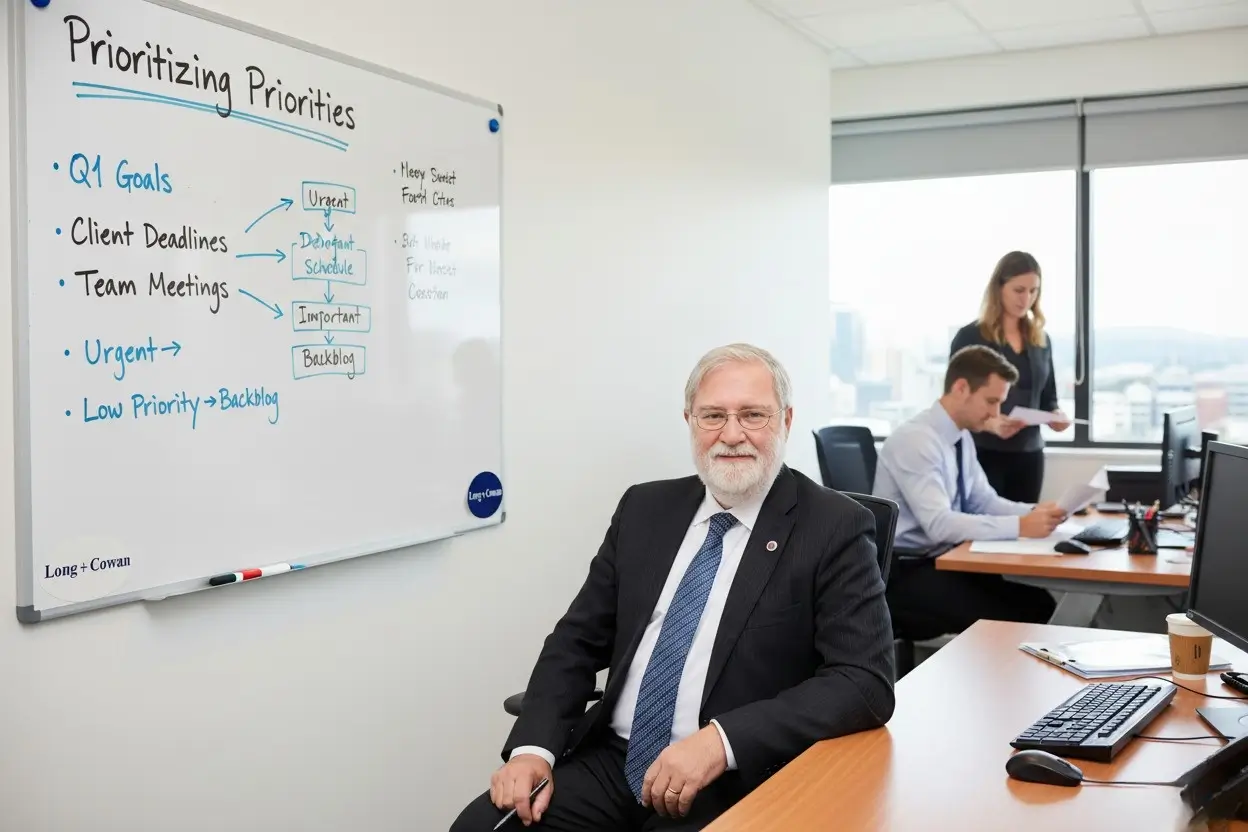Strong business prioritisation allows leaders to make deliberate choices about where to invest time and energy. Without structure, even the most talented professionals risk becoming reactive rather than strategic. At Long + Cowan, we’ve seen businesses across Wellington achieve sustainable growth simply by focusing on what truly drives progress.
Every organisation has competing demands—client expectations, compliance obligations, and internal goals. Prioritisation is not about doing everything; it’s about doing the right things in the right order.
Clarifying Your Objectives
Before deciding what to prioritise, clarify your objectives. What outcomes define success for your business? Is it profitability, growth, efficiency, or client satisfaction? A clear vision provides a filter for decision-making.
Once goals are defined, align all activities with them. Tasks that do not contribute directly should be reduced or delegated. When every action supports a clear objective, progress becomes faster and more predictable.
Distinguishing Urgent from Important
Many managers confuse urgency with importance. Urgent tasks demand attention; important ones create long-term value. Focusing only on urgent matters traps you in a cycle of short-term reaction.
Schedule time for strategic planning before crises arise. Important work includes budgeting, forecasting, and staff development—activities that strengthen the business over time. Balance immediate demands with long-term priorities to maintain control and avoid burnout.
Using Systems to Rank Priorities
Structured systems simplify decision-making. The Eisenhower Matrix, for example, divides tasks into four categories: urgent and important, important but not urgent, urgent but less important, and low priority. Using such frameworks keeps emotion out of decision-making.
Apply consistent criteria when assessing new tasks. Ask whether the activity contributes to goals, generates income, or improves efficiency. Ranking work objectively ensures resources go where they matter most.
Delegating to Focus on Value
Delegation is essential to effective business prioritisation. Business owners often try to manage every detail themselves, wasting valuable time on tasks that could be handled by others. Delegation allows you to focus on leadership, planning, and client relationships.
Trust your team with responsibility and authority. Provide clear instructions and feedback. When routine work is delegated, your schedule opens for high-impact decisions that influence profitability.
Balancing Short-Term and Long-Term Goals
Short-term performance keeps your business running; long-term strategy ensures it thrives. Striking balance between the two requires regular review. Avoid spending so much time on today’s work that you neglect future planning.
At Long + Cowan, we advise clients to reserve part of their week for strategic thinking. Analysing financial data, market trends, and upcoming legislation ensures informed decisions. Long-term focus keeps the business stable even when conditions change.
Identifying and Eliminating Low-Value Tasks
Not all activity adds value. Review recurring processes regularly to identify inefficiencies. Ask whether each task supports your goals or merely maintains routine. Eliminating or automating low-value work creates space for innovation and improvement.
For example, automated invoicing or payroll saves hours of manual effort. Digital tools free staff for tasks requiring professional judgement and creativity, where human input makes the biggest difference.
Using Data to Guide Priorities
Data-driven decision-making replaces guesswork with evidence. Analysing performance indicators, cash flow, and client trends helps determine which areas require attention. Without data, prioritisation becomes reactive and inconsistent.
Review your management reports regularly. Identify patterns in profitability, workload, and customer demand. Let numbers, not assumptions, shape your focus. Businesses that track metrics make smarter choices and waste fewer resources.
Communicating Priorities Clearly
Even the best priorities fail without communication. Staff need to understand what matters most and why. Clear communication aligns effort and prevents confusion. When employees share the same focus, productivity rises naturally.
Hold regular briefings to update your team on shifting priorities. Use simple language and explain the reasoning behind decisions. When people understand purpose, they engage more fully and work more efficiently.
Maintaining Flexibility When Circumstances Change
Priorities shift as markets, clients, and technologies evolve. Effective leaders remain adaptable. Review plans frequently and adjust where necessary. Flexibility does not mean lack of focus; it means readiness to respond intelligently.
For Wellington businesses navigating regulatory changes or economic fluctuations, agility is vital. Monitor developments closely, anticipate adjustments, and communicate changes promptly to maintain stability.
Avoiding Common Prioritisation Mistakes
Many business owners fall into predictable traps: saying yes to everything, chasing perfection, or mistaking activity for progress. Avoid overloading your schedule with minor details that distract from strategic goals.
Perfectionism slows momentum. Focus on progress rather than flawless completion. Time spent polishing small tasks often costs more than the benefit delivered. Allocate effort where it yields the highest return.
Creating Habits That Reinforce Prioritisation
Discipline comes from habit. Begin each day by reviewing your top three tasks. At week’s end, assess progress and adjust next week’s plan accordingly. Regular reflection keeps priorities clear and achievable.
Habits build resilience. Over time, disciplined planning becomes automatic. Teams that follow structured routines complete more with less stress and fewer errors.
Aligning Priorities with Financial Goals
Every major decision should connect to financial outcomes. If a task does not influence revenue, efficiency, or compliance, reconsider its place in your schedule. Linking operational priorities with financial results ensures consistency and accountability.
Long + Cowan clients often integrate financial data with project planning tools. This alignment reveals which efforts generate the best returns and which can be scaled back or automated.
Managing Competing Demands
Modern businesses juggle multiple obligations: customer service, reporting, compliance, and innovation. When priorities compete, use criteria such as urgency, financial impact, and risk to determine order.
Document decisions to maintain transparency. Shared visibility prevents duplication and ensures resources are allocated fairly. Balanced prioritisation protects long-term goals without neglecting daily performance.
Applying Prioritisation Principles in Wellington Businesses
Across Wellington Central, Thorndon, and Karori, local business owners face similar challenges: limited time, growing expectations, and constant change. Applying structured business prioritisation helps control workload, reduce stress, and enhance outcomes.
When everything feels urgent, structure brings relief. By identifying what drives value, Wellington businesses gain clarity and consistency. Prioritisation turns effort into achievement.
Partnering for Strategic Focus
Long + Cowan helps Wellington businesses identify priorities that align with financial health and sustainable growth. Our chartered accountants assist clients with forecasting, planning, and process improvement to ensure focus stays where it matters most.
For tailored advice on aligning time and financial goals, contact us for more info by filling in an enquiry form or e-mailing or calling us during office hours. Focused effort drives measurable success—start prioritising today.
















































